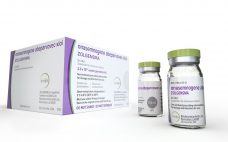Self-proclaimed pioneer of RNA-targeted medicine Ionis Pharmaceuticals says it is looking to develop an “even better medicine” to Spinraza to treat spinal muscular atrophy (SMA). At its annual meeting of stockholders earlier this month, Ionis Pharmaceuticals spoke about the success of its flagship molecule, Spinraza (nusinersen), an oligonucleotide approved by the US Food and Drug Administration (FDA) in December 2016 for the treatment of SMA. “Spinraza is the standard-of-care for all forms of the disease SMA. It is a medicine…

Therapeutic Class
Servier selects Yposkesi for viral vector supply
The deal brings Servier access to CDMO Yposkesi’ lentiviral vector production for its Phase I allogeneic CAR-T candidate UCART19. Servier has chosen contract development manufacturing and organization (CDMO) Yposkesi to provide the lentiviral vectors for its candidate UCART19, an off-the-shelf chimeric antigen receptor (CAR) T-cell in trials for haematological malignancies. According to the firm, its selection of fellow French CDMO came “after testing lentiviral vectors from several competitors and comparing the costs,” though financial and timelines details have not been…
Zolgensma: We all know the price, but how is it made?
Making Zolgensma, the new “world’s most expensive drug,” is a month-long process that depends on vector tech licensed from Regenxbio. Zolgensma is a gene therapy. It is designed to halt progressive spinal muscular atrophy (SMA) – motor neurone loss and muscle wasting – in people who have a defective version of the gene SMN1. The drug addresses the underlying causes of SMA according to Novartis spokesman Eric Althoff. He told us, “Zolgensma provides a functional copy of the human SMN…
Pluristem looks to cell cultured cannabinoids
Pluristem Therapeutics has filed a provisional patent application to use its 3D cell culturing technology to manufacture cannabinoid-producing cells. Pluristem has several candidates in its pipeline based on placenta-derived, mesenchymal-like adherent stromal cells, has inked a recent study agreement with NASA, and is working with Thermo Fisher to address the lack of technologies available to cell therapy manufacturers for the cultivation and processing of allogeneic products. Now the Israeli cell therapy firm is looking to use its cell culture platform…
Costs and quality will shape cell and gene therapy tech development
Cell and gene therapies as well as wider industry desire for cost efficiency will shape bioprocessing tech innovation, say experts. Biopharma interest in cell and gene therapies is increasing. Products like Kymriah, Luxturna and Yescarta are the tip of an R&D iceberg according to PhRMA, which says around 300 such treatments are in development. The trend has been well received, with various groups suggesting it will yield treatments for untreatable conditions (see here, here and here, for examples). Investors have…
Making rare disease successes more common
Complex pathologies and small patient populations make rare disease R&D difficult according to Alexion, which says recent FDA guidelines are welcome. At large biopharma firms, rare disease drug R&D projects are becoming common. Their high revenue potential combined with IP advantages afforded to such products makes them an attractive focus for developers. For example, orphan drug designation entitles firms to reduced fees, tax breaks for trials and extended market exclusivity. Investors also welcome such designation. According to one study, developers…
Partnerships abet vendors in tackling cell & gene logistics and automation
With Thermo Fisher teaming with automated tech company Scinogy and GE Healthcare collaborating with logistics firm World Courier, both vendors have increased their advanced therapy services. The recent approval of Novartis’ one-off gene therapy Zolgensma (onasemnogene abeparvovec) has cemented the advent of advanced therapies. With hundreds more cell and gene therapies in development, the US FDA has predicted that up to 20 such products will be approved each year by 2025. Vendors, therefore, have been increasing their commercial services technologies…
Zolgensma approval marks success for REGENXBIO’s vector platform
REGENXBIO could receive up to $80 million after the US FDA approved Novartis/AveXis’ gene therapy Zolgensma (onasemnogene abeparvovec), which uses the firm’s NAV Technology Platform. Last week, the US Food and Drug Administration (FDA) approved Zolgensma, a single-dose gene therapy developed by Novartis acquisition AveXis, for the treatment of children less than two years of age with spinal muscular atrophy (SMA). The approval triggered a $3.5 million (€3.1 million) milestone payment to Maryland-based biotech REGENXBIO. Zolgensma is based on REGENXBIO’s…
Personalized medicines need personalized pricing plans, Orchard
There is no one-size-fits-all model for cell and gene therapy pricing plans says Orchard Therapeutics, but industry must adapt a system set up for chronic care to incorporate curative one-off treatments. There have been questions over how payors and insurance firms would cope with such next-generation therapeutics have been asked ever since Novartis launched its first cell and gene therapy product Kymriah (tisagenlecleucel) in 2017 at a list price of $475,000. But the recent US Food and Drug Administration (FDA)…
Novartis wins approval for $2.1m gene therapy Zolgensma
Novartis says it is ready to launch Zolgensma (onasemnogene abeparvovec) within the next few weeks after receiving FDA approval for its spinal muscular atrophy (SMA) single-dose gene therapy. Zolgensma, a single-dose, one-time gene therapy has been approved to treat children less than two years of age with spinal muscular atrophy (SMA). “Today’s approval marks another milestone in the transformational power of gene and cell therapies to treat a wide range of diseases,” acting US Food and Drug Administration (FDA) commissioner…









